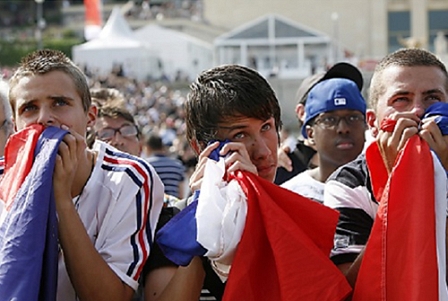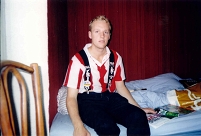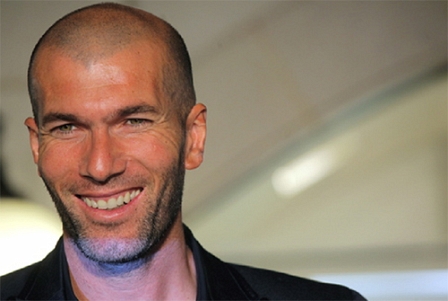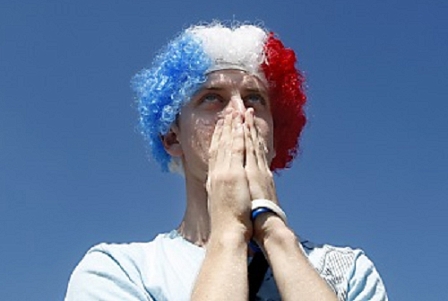Erstellt am: 23. 6. 2010 - 15:47 Uhr
Why I grieve for Les Bleus
It's a bitter irony. The fortunes of Les Bleus, the formerly world-beating team once celebrated for its multi-ethnicity as the Rainbow Team, reached its nadir in the Rainbow Nation of all places.
Who says football doesn’t matter? It certainly seems to right now in France - where the disastrous exit of a divided Les Bleus team has become Une Affaire d’Etat and the one-time heroes have been politically chastised as "morally bankrupt".
Indeed Roselyne Bachelot, the French Minister has spoken of a "moral disaster" for French football. Ahead of last night’s game, she claims she told the players that they had "tarnished France" with their public squabbling, sulking and petulance. A presidential inquiry has been called into the team’s affairs.

epa/LUCAS DOLEGA
Just to remind you in case you have been on Mars, in slumping to 4th place in World Cup Group A, France, the finalists of the last tournament and former dominant force in world football, managed just 1 point and 1 goal in 3 games. There were rumours of major internal divisions. Players were seen on the bench glowering and muttering like naughty school boys passing notes about the unpopular teacher, played with comic genius by the hapless Raymond Domenech.
And then, last week-end, leggy forward Nicholas Anelka was sent home in disgrace after a foul-mouthed half time tirade was leaked to the press. In reaction to his exiling, the team refusing to train ahead of the final group match, talking off the training ground, ensconcing themselves into the team bus and drawing the curtains before sending coach Raymond Domenech out to make a trite statement about the teams "dissatisfaction" with the French football federation. Ahead of last night's final group game against South Africa, Pundits on the Guardian's World Cup Daily podcast waggishly asked whether the team would field 2 strikers or all 23. The famous grève francaise! And on Monday, icon Zinedine Zidane gave his ex-colleagues a verbal head-butt. "They're being spat upon," he told a news conference in Johannesburg, "Maybe they deserve it."
Ouch!
Now there are those who will gloat in the misfortune of 23 overpaid molly-coddled football players and their esoteric coach. Some, particularly Ireland fans, will point out that France’s appearance at the World Cup finals owed a huge debt of gratitude to a Thierry Henri handball in the final minutes of the play-offs. And some will mock the downfall of a sporting power whose self-satisfaction is only-rivaled and bettered by their cousins across the channel.
But I’m not among those who gloat. I grieve for Les Bleus. They used to stand for something beautiful.

FM4 / Chris Cummins
At the end of the 1990’s, during a burst of Orwellian enthusiasm, I worked alongside in the kitchen in an industrial style restaurant in Paris. At that time Les Bleus were dominant in world football. They had just won the World Cup, beating Brazil 3-0 in a final held in the State de France in Paris, and they would march on to win the following European Championships.
All my colleagues in the kitchen in Paris came from immigrant backgrounds. Many turned up to work in the blue replica kits of the French national team and most reveled in the success or the team as a source of pride in their identity. Then, as now, the team’s backbone was made up by second or even first generation immigrants from North and West Africa players, many of whom had grown up in the troubled estates of the outlying urban "banlieux". The success-spoiled stars of the Rainbow Team seemed like real role-models in an immigrant society wracked by economic and identity problems. When I kicked a ball around with my colleagues on a day off, they jokingly dubbed me Didier Deschamps - one of the only white faces on the French team.
Paris based author and journalist Andrew Hussey notes in the Observer that "Almost without exception, French people of a certain age now refer to the match in the Stade de France as the defining moment of their late 20th century." Hussey goes on to describe how the (now under-fire) striker Thierry Henry still recalls an elderly French woman thanking him for giving the nation "its greatest moment since the Liberation."
As long as the team was winning, the multi-racial aspect of the team became a proud symbol of unity. They weren't boys from the dreaded suburban ghetto, they were "our boys". And their success was a slap in the face for the anti-immigration message of the far right. The toad-like National Front leader Jean Marie Le Pen had made a career out as presenting non-white immigration as a great threat to French identity, and now his bogeymen had become national heroes. Zinedine Zidane, who masterminded the on-pitch triumphs, is a man of few words and is not known for political diatribes. But his pithy comments on winning the World Cup had huge resonance in the kitchen where I worked: "I didn’t do it for Le Pen."

EPA/YM YIK
But now that "L'Effet Zidane" has faded, tarnished by that head-butt, and now that the success has so dramatically dried up, the French establishment has been quick to forget the debt they owe to the highly skilled, multi-racial footballers from the suburbs and have turned on them.
Morally outraged team sponsors have begun abandoning the team and the players, including a major bank and a fast food chain (and when bankers and fast food makers start judging you, you know you are in trouble!) Politicians have already judged the disaster of South Africa to qualify as an indictment of a generation-X that believes in nothing but self-enrichment.
French politicians, social commentators and self-important philosophers have been competing to slam the players the loudest. Almost invitably their heritage has come back to haunt them. The politicians say that the class of 2010 cares nothing for the shirt. Indeed, it’s decried that they have no respect for anything but money. Typical of the valueless kids of the banlieue, they say. Much has been made of the fact that few French players sing along when the national anthem is played. Eric Abidal was even pictured waving to the crowd during the Marseillaise and William Gallas’s wide-mouthed bellowing of the tune has been deemed as to little too late after 80 odd caps of silence.
It hasn’t helped that captain Patrice Evra spent part of the run-up to the tournament negociating per player bonuses for wining in the case of reaching and winning the final (rumoured to be between €150,000 and €300,000). Suddenly everyone wants to talk about discipline and patriotism and respect again. Not surprisingly, the far-right has discovered that it does have something to say about the national football team again.
Raymond Domenech, surely the most reviled and ridiculed French coach in the nation’s history, left the stage with a moody refusal to shake the hand of his opposite number, Carlos Alberto Parreira. It’s time for a new start, a clean sheet. The new coach has, at least, the right name. "Laurent Blanc will arrive in a few days on to a field of ruins" wrote Le Parisien this morning.

EPA/LUCAS DOLEGA
Personally, I hope he can resurrect the dream of flashy multicultural European football that I shared with my colleagues in that sweaty kitchen off Les Grand Boulevards at the turn of the century.
Given the wealth of talent at his disposal, perhaps he can bring back the joy on the pitch, but, I now fear, the rest - that 'new era of social cohesion' - was never more than a mirage anyway, brought on by the gallons of beer and bubby that flowed on the Champs d'Elysees back in 1998.
It was, perhaps, a romantic dream that never reflected reality. In 2001, months after I left Paris, France played Algeria in a friendly. French born Islamic youth waved Algerian flags and chanted against Zidane, labeling him a traitor and the match ended with a violent pitch invasion. The following year Le Pen made the run-off in the Presidential election. In 2005, during riots in the banlieux, Nicolas Sarkozy, the future President, vowed to "hose down" the suburban concrete jungle " that had spawned World Cup winners like Lilian Thuram. Now, among the drudgery of everyday life, the forgotten youth of Paris don’t even have the escapist solace of success on the pitch from their footballing heroes.
France's presidential palace says Thierry Henry will meet with President Nicolas Sarkozy to discuss the national team's World Cup debacle. I hope he tells him not to make political capital out of what was, after all, a mere sporting failure. Sarkozy would better spend his time thinking of a more lasting way to make young Frenchmen of all backgrounds feel good about themselves again.


